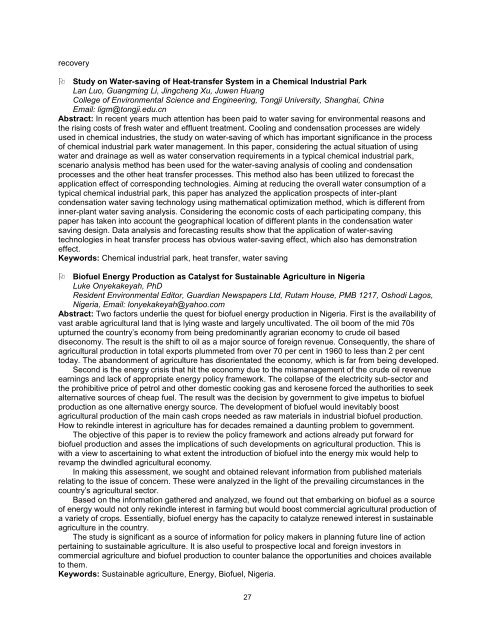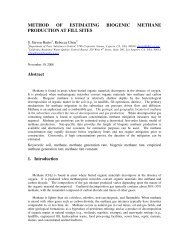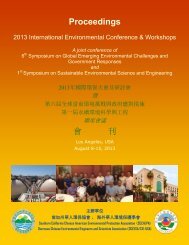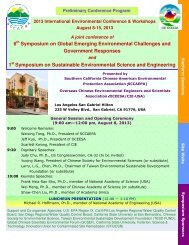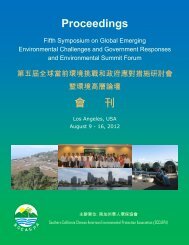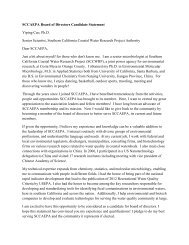Proceedings æ å - SCCAEPA SPONSORS
Proceedings æ å - SCCAEPA SPONSORS
Proceedings æ å - SCCAEPA SPONSORS
Create successful ePaper yourself
Turn your PDF publications into a flip-book with our unique Google optimized e-Paper software.
ecovery<br />
Study on Water-saving of Heat-transfer System in a Chemical Industrial Park<br />
Lan Luo, Guangming Li, Jingcheng Xu, Juwen Huang<br />
College of Environmental Science and Engineering, Tongji University, Shanghai, China<br />
Email: ligm@tongji.edu.cn<br />
Abstract: In recent years much attention has been paid to water saving for environmental reasons and<br />
the rising costs of fresh water and effluent treatment. Cooling and condensation processes are widely<br />
used in chemical industries, the study on water-saving of which has important significance in the process<br />
of chemical industrial park water management. In this paper, considering the actual situation of using<br />
water and drainage as well as water conservation requirements in a typical chemical industrial park,<br />
scenario analysis method has been used for the water-saving analysis of cooling and condensation<br />
processes and the other heat transfer processes. This method also has been utilized to forecast the<br />
application effect of corresponding technologies. Aiming at reducing the overall water consumption of a<br />
typical chemical industrial park, this paper has analyzed the application prospects of inter-plant<br />
condensation water saving technology using mathematical optimization method, which is different from<br />
inner-plant water saving analysis. Considering the economic costs of each participating company, this<br />
paper has taken into account the geographical location of different plants in the condensation water<br />
saving design. Data analysis and forecasting results show that the application of water-saving<br />
technologies in heat transfer process has obvious water-saving effect, which also has demonstration<br />
effect.<br />
Keywords: Chemical industrial park, heat transfer, water saving<br />
Biofuel Energy Production as Catalyst for Sustainable Agriculture in Nigeria<br />
Luke Onyekakeyah, PhD<br />
Resident Environmental Editor, Guardian Newspapers Ltd, Rutam House, PMB 1217, Oshodi Lagos,<br />
Nigeria, Email: lonyekakeyah@yahoo.com<br />
Abstract: Two factors underlie the quest for biofuel energy production in Nigeria. First is the availability of<br />
vast arable agricultural land that is lying waste and largely uncultivated. The oil boom of the mid 70s<br />
upturned the country‟s economy from being predominantly agrarian economy to crude oil based<br />
diseconomy. The result is the shift to oil as a major source of foreign revenue. Consequently, the share of<br />
agricultural production in total exports plummeted from over 70 per cent in 1960 to less than 2 per cent<br />
today. The abandonment of agriculture has disorientated the economy, which is far from being developed.<br />
Second is the energy crisis that hit the economy due to the mismanagement of the crude oil revenue<br />
earnings and lack of appropriate energy policy framework. The collapse of the electricity sub-sector and<br />
the prohibitive price of petrol and other domestic cooking gas and kerosene forced the authorities to seek<br />
alternative sources of cheap fuel. The result was the decision by government to give impetus to biofuel<br />
production as one alternative energy source. The development of biofuel would inevitably boost<br />
agricultural production of the main cash crops needed as raw materials in industrial biofuel production.<br />
How to rekindle interest in agriculture has for decades remained a daunting problem to government.<br />
The objective of this paper is to review the policy framework and actions already put forward for<br />
biofuel production and asses the implications of such developments on agricultural production. This is<br />
with a view to ascertaining to what extent the introduction of biofuel into the energy mix would help to<br />
revamp the dwindled agricultural economy.<br />
In making this assessment, we sought and obtained relevant information from published materials<br />
relating to the issue of concern. These were analyzed in the light of the prevailing circumstances in the<br />
country‟s agricultural sector.<br />
Based on the information gathered and analyzed, we found out that embarking on biofuel as a source<br />
of energy would not only rekindle interest in farming but would boost commercial agricultural production of<br />
a variety of crops. Essentially, biofuel energy has the capacity to catalyze renewed interest in sustainable<br />
agriculture in the country.<br />
The study is significant as a source of information for policy makers in planning future line of action<br />
pertaining to sustainable agriculture. It is also useful to prospective local and foreign investors in<br />
commercial agriculture and biofuel production to counter balance the opportunities and choices available<br />
to them.<br />
Keywords: Sustainable agriculture, Energy, Biofuel, Nigeria.<br />
27


